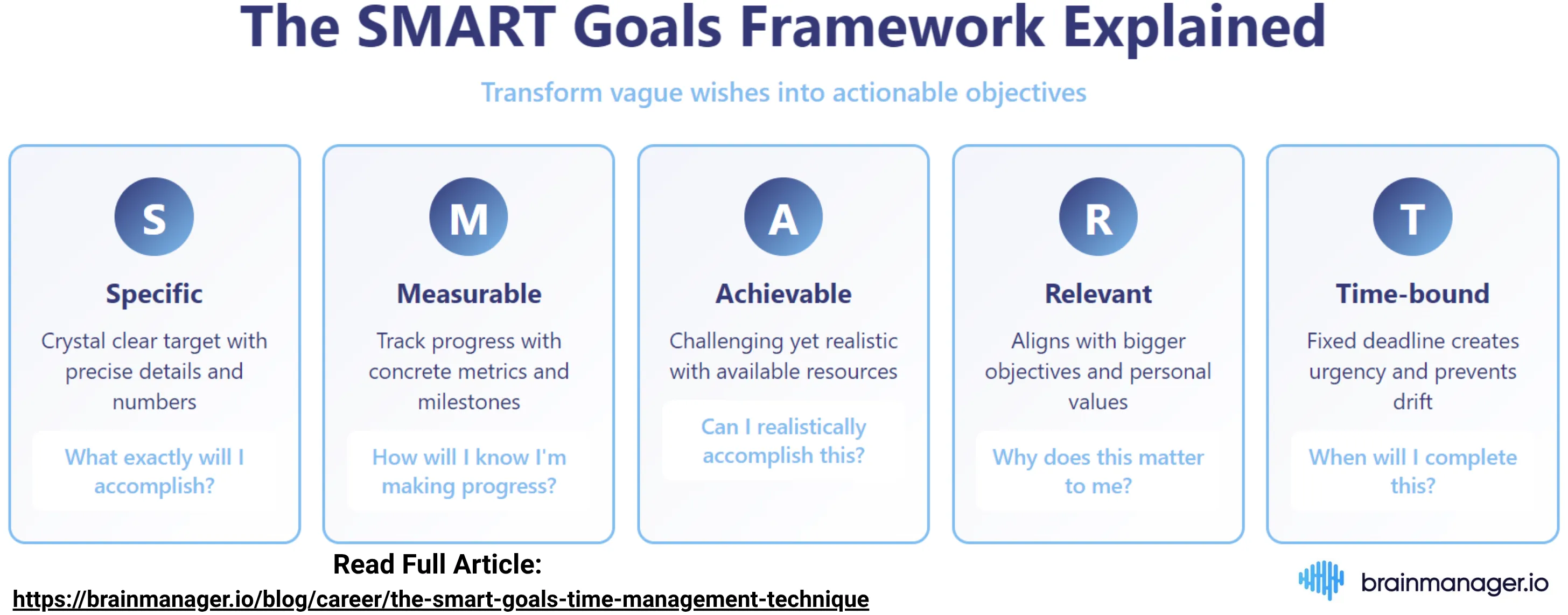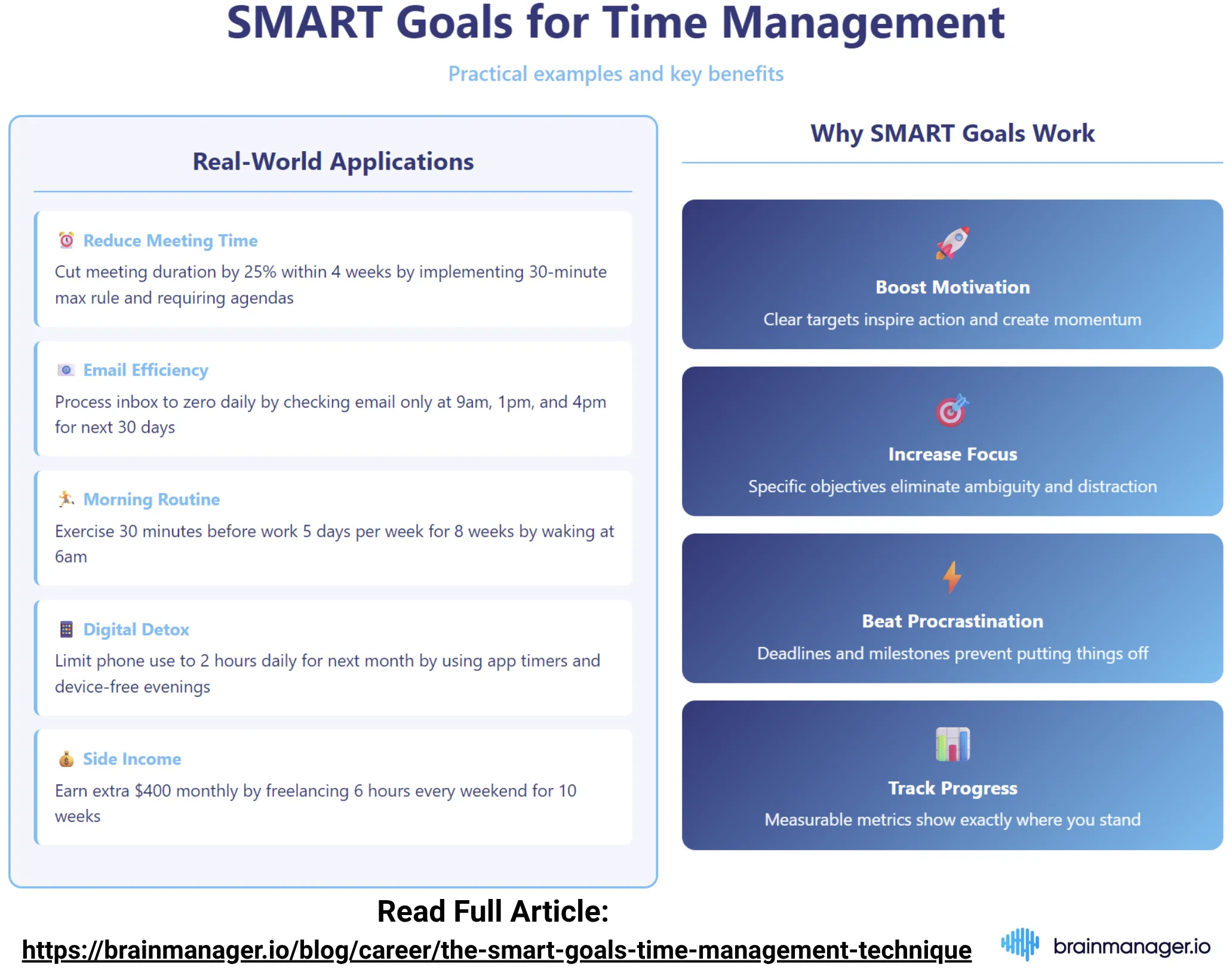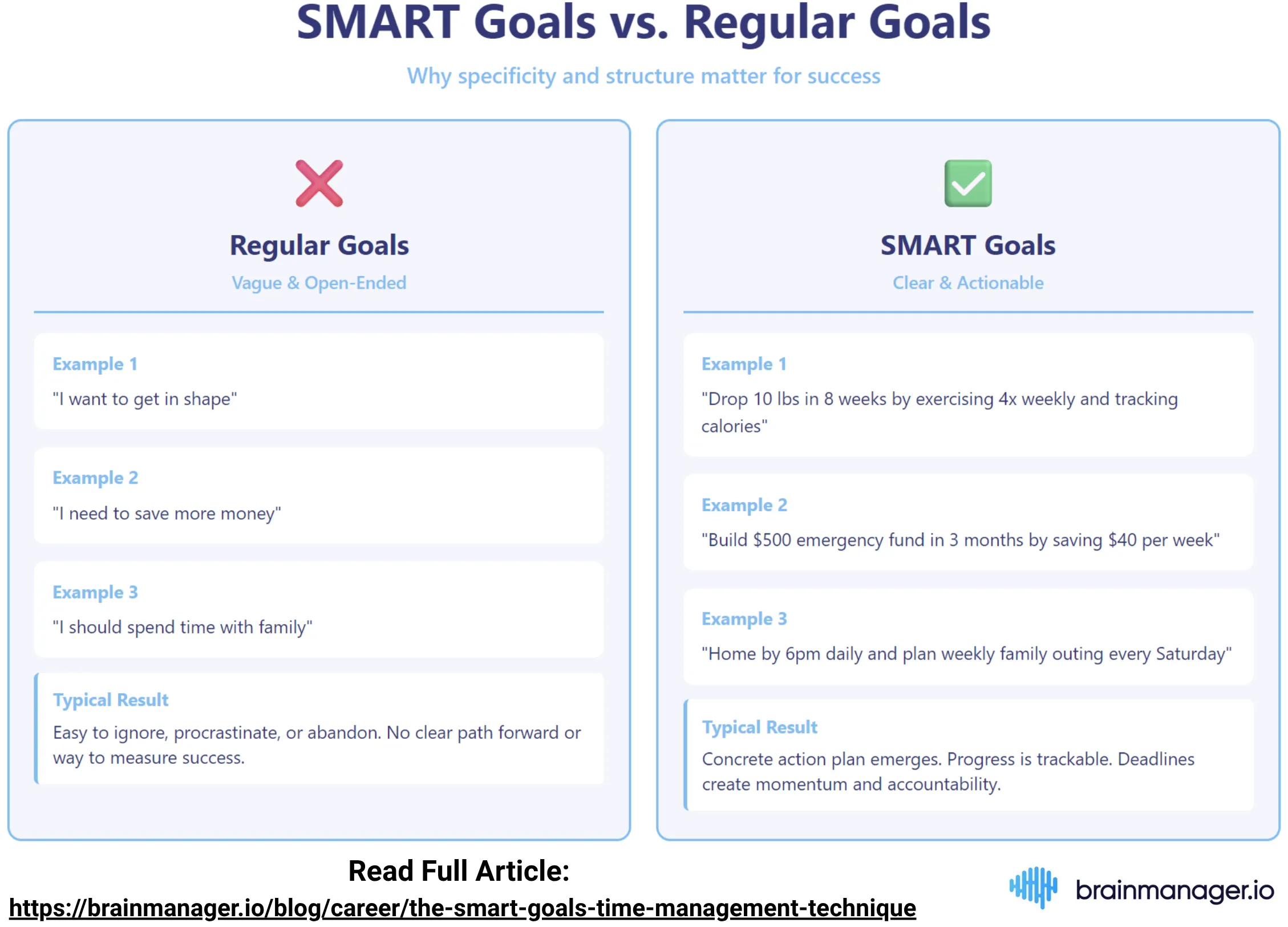SMART Goals to Manage Time Better: How to Become a Time Management Wiz!
You'll need to know how to set goals and manage time efficiently for success in your personal and professional life. Fortunately, the SMART goals technique combines both and is easy to learn and implement. Learn how to apply it to your time management strategy.


Back
7 mins read
So, you’ve decided to get serious about time management (no, really, this time, you totally get the benefits!).
You hop on the internet and read a bunch of time management articles. You may have even taken an assessment to see how good your time management skills are. Before long, you're neck deep in time management techniques, anticipating how you'll use them to become a time management wiz.
Hold on a minute (pardon the time management pun).
Before you dive headfirst into the ocean of time management techniques, how about taking some time to set some goals first? That way, you don't lose sight of your objective and can make course corrections when needed.
One technique can help you do that, and it's called the SMART goal technique. You can greatly increase your chances of time management success by simply taking a few minutes to apply it.
You're probably wondering what these SMART goals are, how they differ from regular goals, and how they will help you manage time. Don't worry. This article will explain everything about the SMART goals technique and give you examples from which you can model your own SMART goals.
Set your mind on a definite goal and observe how quickly the world stands aside to let you pass. — Napoleon Hill
What Are SMART Goals?
Goals are objectives you want to meet, targets to work towards, and desires you strive to make into reality.
You’re probably already very familiar with goals and have experience setting them.
For example, as a kid, you decided what you wanted to be when you grew up and set a goal even if you didn't know it yet. Another example you may relate to is New Year’s “resolutions" — which is really just another name for goals — where you list everything you'd like to be or change in the new year.
The problem, however, with run-of-the-mill goals is that they are not always doable, concrete, or timely enough to inspire action. It's why I never realized my childhood dream of becoming a Power Ranger and why your New Year's resolutions are just a carbon copy of last year's.
That's where SMART goals come in; SMART is an acronym that stands for:
S - Specific
M - Measurable,
A - Achievable,
R - Relevant, and
T - Time-bound.
This acronym has a couple of variations, such as Specific, Meaningful, Achievable, Realistic, and Time-bound.

Ultimately, irrespective of the words used, SMART is simply a checklist for evaluating the quality of your goals.
The idea behind the technique is that every time you make a goal, you must test it against every aspect of the SMART method. You must ask yourself, “Is this goal concrete and real?” “How will I measure my progress?” “What are the odds of success?” “How does it tie into my long-term plans?” and “How long will it take to complete?”
Asking and answering all these questions transforms your goal from a vague and uncertain new-years-resolution-type goal (which we all make but never achieve) into a target you can aim for and direct your energies towards.
5 Elements of SMART Goal Setting for Time Management
Whether or not your goal is SMART — specific, measurable, attainable, relevant, and time-bound — can be the difference between success and failure, and how productive you actually are. That's why we've taken the time to explain what each of these parameters means.
S - Specific
You know how you run into an old friend, and after exchanging pleasantries, you both declare that “we really should meet up sometime” but never set a date, and ultimately, that meet-up never happens?
The same thing happens when you set vague goals. Even a little ambiguity makes it easy to brush plans aside, so you must ensure your goals are as watertight as possible. Target one area, clearly state what you want to accomplish, and use exact numbers where possible.
For example, if you're a salesperson, instead of setting a goal to "increase sales," your goal should be to sell "X" units (with a specific target number of sales).
One thing that can help here is to remember the "5 W questions”:
- What do I want to accomplish?
- Why is it important?
- Who are the people involved in this goal?
- When do I want to achieve this?
- Where do I need to be to achieve this goal?
Asking yourself these questions can help you transform a general goal into a specific one you can pursue.
M - Measurable
A goal is no good if you can't tell when you've reached it or how close or far you are from achieving it. You need an accurate means of gauging your progress so that you can determine whether you're making headway and make course corrections if not.
One way to do this is to make milestones; as you meet these milestones, each brings you closer to your final goal. For example, if your goal is to become a successful musician, your milestones may be reaching a thousand, then ten thousand, and finally, a million streams on Spotify.
Measuring your progress like this helps you stay excited about your goal while progressing with the result in mind.
A - Achievable
There’s nothing wrong with aiming high, but you must also be realistic. Fanciful goals with no real chance of success will only lead to frustration and burnout. So, evaluate your goals to ensure a reasonable chance of reaching them.
It helps at this stage to develop an action plan for how you will achieve your goals. If you can lay down a step-by-step process, you can chart your course to success. It’s also a good idea to pick up some positive affirmations to reduce stress and stave off burnout when the going gets tough.
Of course, nothing in life is certain, and things will not always pan out as you expect. If that's the case, don't be discouraged. All it means is that it's time to restructure your goal into something equally challenging but also possible.
R - Relevant
Your goals should tie into each other to form a coherent whole. Don't just set goals on a whim or because everyone’s doing it. Instead, take time to consider the merits of each goal you create. They should not just be worthwhile but worthwhile to you. They should matter, advance your long-term goals, and complement other aspects of your life.
The Eisenhower Method and the Pareto Principle can be of great help with this (we have 2 great guides on these in our free member's area). You can use these techniques to analyze the quality of your goals and discern which will bring the most returns.
T - Time-bound
There's an expression: a goal without a deadline is just a dream.
Every one of your goals must have an end date. That's because, in goal setting, open-ended goals are the enemy. They encourage you to procrastinate and cause relatively simple goals to persist longer than needed.
On the other hand, when you have a deadline to meet, you’ll be motivated to work towards your goal.
A time requirement works hand in hand with measurability since you can assign deadlines to milestones and track your progress more efficiently. When setting the things you need to do to reach your goal, make sure to break it down into chunks.
What Benefit Does SMART Goal Setting Have on My Time Management?
The SMART technique helps you set valid goals that you can achieve quickly and efficiently with the aid of other time management techniques. Additionally, the technique can help you with the following:
- Boost your motivation.
- Increase your focus.
- Overcome procrastination.
How to Use the SMART Goals Technique for Time Management
You can use the SMART method for time management in two significant ways.
The first is to use it to set the goals you will use other time management techniques to achieve in the shortest possible time. After all, what good is all the time in the world if you don't know what to do with it?
The other use for this technique is to create time management goals that you will strive to meet using time management techniques.
For example, you can use the SMART goal technique to make a goal to cut down your meeting time by 20% in a month. You can then use the 80/20 rule to try and achieve this goal.
The beauty is that as you develop your time management system, you're bound to try out several techniques. This method can help you get the most value from each and evaluate your compatibility with them.
Examples of SMART Goals for Time Management

Now that we’ve gotten all that theory out of the way, it's time to see the SMART goal technique in action.
For that, we’ve transformed a couple of regular goals into SMART goals and broken down the process so that you can understand how to do the same for your own goals.
Goal: Lose weight
- Specific: Lose 8 pounds by creating and sticking to a healthy diet and exercise regimen.
- Measurable I will measure my progress by weighing myself to ensure I lose at least 2 pounds weekly.
- Achievable: The target of 8 pounds is reasonable, and my exercise sessions will take place in the morning and night so that they do not interfere with my work.
- Relevant Losing weight will make me healthier and more confident, and that will benefit my professional and social life.
- Time-bound: This goal has a time limit of one month.
Goal: Make More Money
- Specific: Earn an extra $300 by freelance writing on weekends.
- Measurable: I can measure my weekly income. I should make at least $70 weekly.
- Achievable: I can dedicate three hours every Saturday and Sunday to writing projects.
- Relevant: I can use the proceeds of my side hustle to pay for training that will make me better at my job.
- Time-bound: I have given myself a seven-week deadline.
Goal: Make More Time for My Family
- Specific: Get home by 5 pm and go on a family outing every Saturday.
- Measurable: I can measure my progress by tracking the number of hours I spend with my family. The minimum is 3 hours each day.
- Achievable: I can employ time management strategies so that I don't have to work overtime.
- Relevant: A healthy home relationship will complement my work life.
- Time-bound: I must achieve this goal by the end of the month.
Set SMART Goals for Better Time Management
If you made it this far, you’re all caught up on the SMART technique. All that’s left is to put what you’ve learned into practice. So, revisit your life goals and SMART-en them up.
Get rid of ambiguous terms, set up milestones, add a time limit, and keep things realistic.
You'll be surprised how much more work you'll get done simply by having SMART-er goals.
You may also want to read these other articles available in our free member's area:
- Life Planning 101: How to Reach Your Goals with Ease
- How to Motivate Yourself – Use Self-Management Skills to Reach Your Goals


Return to Blog









